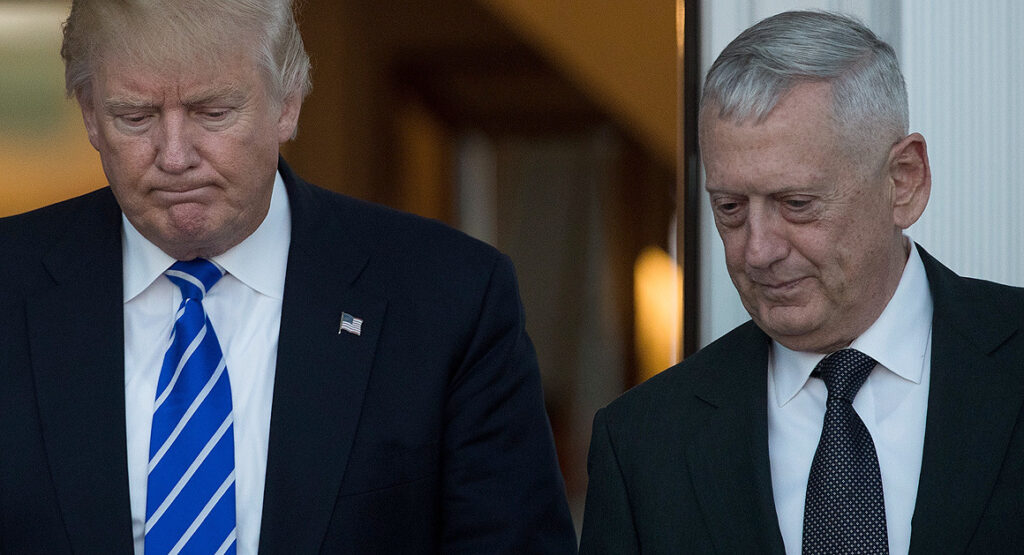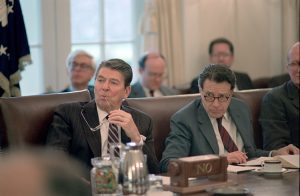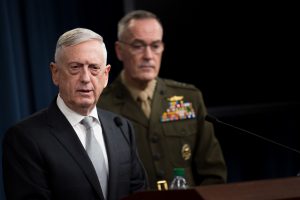By ROBBIN LAIRD
President Trump and Defense Secretary Jim Mattis
 Whatever you think of Jim Mattis, his resignation and the outflow of officials that will follow create a major foreign policy problem for the United States. There is not one ally who is applauding Mattis’s departure — but depart he will, all the same. So what must President Trump and his next defense secretary do, not only to reassure the allies, but shape the strategy for a dangerous world?
Whatever you think of Jim Mattis, his resignation and the outflow of officials that will follow create a major foreign policy problem for the United States. There is not one ally who is applauding Mattis’s departure — but depart he will, all the same. So what must President Trump and his next defense secretary do, not only to reassure the allies, but shape the strategy for a dangerous world?
Secretary Mattis is just the latest administration official to leave, but his is really the most important departure. Mattis, Joint Chiefs chairman Gen. Joseph Dunford (also to depart in 2019), and their team shaped a new National Defense Strategy which focused on the strategic shift from interminable guerrilla wars on land to preparing to deal with peer competitors on land, at sea, and in the air, space, and cyberspace. Apparently, the President saw terminating the endless war in Afghanistan as part of this approach; Mattis did not.
Secretary of Defense Jim Mattis and the Chairman of the Joint Chiefs of Staff, Gen. Joseph Dunford, brief the press
It’s a president’s prerogative to make this kind of strategic change. But sudden shifts — on Afghanistan, on Syria, on the budget — confuse and alarm allies who saw Mattis, with his decades of public service, as a pillar of continuity in an unpredictable administration. Yes, Mattis and Gen. Dunford played leading roles in shaping the new strategy, but they also reassured our allies about these changes. It is no secret that US allies, including our closest ones, have been concerned from the outset with Trump’s approach to alliance politics and commitments.
No, we really do not know all of the details of the Trump-Mattis dynamic. But we do know that the President, either by design or accident, has never put together a transparent policy making process. That’s a problem, because transparency is a key part of changing US global policy. Disrupting US policy and commitments by itself is not a policy.
Here’s the potential upside: The departure of Mattis provides the President with an opportunity to provide clarity about his real policy agenda and to appoint people who will not only shape a policy process but will provide public transparency with regard to that process. A core part of that clearly needs to be a more effective process of working with allies.
Defense Secretary Jim Mattis addresses the NATO summit.
 The issue is not just reassuring allies; it is much more profound than that. It is about the effective defense of American and allied interests in dealing with the peer competitors. What’s more, because mutual trust and public perception are critical to managing any crisis with a peer, deterrence requires more effective and transparent working relationships among the US and the key allies. And here the President faces a key challenge: how to craft a policy process where both confidence and transparency are evident to our allies. It would be immensely helpful if the President’s foreign visits supported such a process, rather than becoming volatile events which require his administration to clean up afterwards.
The issue is not just reassuring allies; it is much more profound than that. It is about the effective defense of American and allied interests in dealing with the peer competitors. What’s more, because mutual trust and public perception are critical to managing any crisis with a peer, deterrence requires more effective and transparent working relationships among the US and the key allies. And here the President faces a key challenge: how to craft a policy process where both confidence and transparency are evident to our allies. It would be immensely helpful if the President’s foreign visits supported such a process, rather than becoming volatile events which require his administration to clean up afterwards.
As the President appoints a new Secretary, it will be important for him to reaffirm the new national security strategy and underscore that it is not an historical relic of the Mattis period. His administration has been too much like an ongoing Rorschach test which both critics and supporters read into what they want to see.. We need a clear policy process that lets the Congress, the citizenry, and our allies all know what to expect and how they can have a say in shaping the strategy.
President Reagan and Defense Secretary Weinberger
 History proves that this is possible. If we look back to the Reagan years — to how Reagan was really seen at the time, before anyone knew the Wall was about to fall and the Cold War to end — we can see a leader much criticized and widely disliked in Europe. Reagan confronted the critics and took on the Soviets. But he was very clear about what he was doing and had a policy team you could work with to understand, criticize, and shape away ahead. Reagan clearly respected allies and adversaries alike and found ways to work together.
History proves that this is possible. If we look back to the Reagan years — to how Reagan was really seen at the time, before anyone knew the Wall was about to fall and the Cold War to end — we can see a leader much criticized and widely disliked in Europe. Reagan confronted the critics and took on the Soviets. But he was very clear about what he was doing and had a policy team you could work with to understand, criticize, and shape away ahead. Reagan clearly respected allies and adversaries alike and found ways to work together.
This is an example worth emulating for President Trump, and he can start with his appointment of a new Secretary of Defense and that nominee’s testimony before the Senate for confirmation. If the president wants to leave behind a solid historical legacy in the foreign and defense arenas, he can must pick the right person for his new Secretary of Defense and move towards a transparent policy process.
I remain hopeful. But as the Yiddish proverb puts it: “It’s good to hope; it is the waiting that spoils it.”

No comments:
Post a Comment